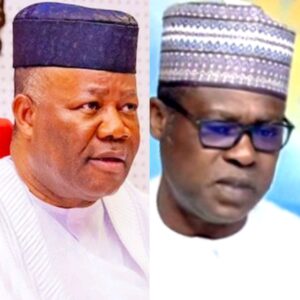
Mathias Tsado, a political analyst and public affairs commentator, has expressed new worries regarding transparency and selective prosecution in Nigeria’s anti-corruption efforts, especially at the highest governmental levels.. CONTINUE FULL READING>>>>>
During a recent appearance on TVC News, Tsado questioned the lack of discussion surrounding a purported N108 billion corruption case involving Senate President Godswill Akpabio. He challenged the EFCC and the larger political establishment to provide an explanation of the case’s current state.
“The case of EFCC against the Senate President involving N108 billion, has it been closed?” Tsado posed a direct question. His remarks have rekindled the legislative branch of Nigeria’s accountability debate, particularly with regard to politically influential individuals. Tsado voiced dissatisfaction over what he called a pattern in which anti-corruption charges involving high-ranking officials appear to disappear as soon as those persons move up the corporate ladder.
“You’re being investigated when you’re just a senator or former minister. However, the files abruptly stop being heard after you are elected Senate President or are close to the president. Nigerians are entitled to know if the lawsuit has been settled or is now forgotten. He went on. Tsado’s comments seem to allude to earlier petitions and media reports that claimed financial irregularities occurred while Akpabio was Minister of Niger Delta Affairs. Despite acknowledging receipt of petitions and initiating investigations, the EFCC has not provided any public updates in recent years, particularly since Akpabio was elected Senate President in 2023.
Tsado contended that the public’s confidence in Nigeria’s anti-corruption mechanisms is weakened by this silence. “When the rule of law is applied selectively, we cannot create a credible democracy,” he stated. “Prosecute it if there is a legitimate case. Let the public see the proof if it has been settled. As of the time of writing, the EFCC had not responded to Tsado’s remarks in an official manner. Attempts to get the agency to clarify the situation failed.
Echoing Tsado’s concerns, civil society organisations have called on the EFCC to either publicly end the case with clarity or, in the event that investigations are still ongoing, to go forward in a transparent manner. Tsado’s question has resonated with Nigerians who expect fairness and honesty in public service, regardless of position or status, as their displeasure with the elite’s apparent impunity grows.CONTINUE FULL READING>>>>>
